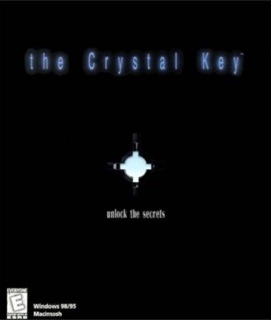With the many high quality productions from which you can choose, The Crystal Key should be among your last of choices.
Story
As with Myst, the story in The Crystal Key does not play a particularly large role in the game. The basic storyline is that there is an evil alien on his way to invade Earth... and you need to stop him. You get shot up onto an asteroid(?) that has appeared near Earth, which serves as your Myst Island central world, and you have to figure things out from there. In fact, this is almost the entire story. You do run across some holograms of people spewing something about running from the alien guy, but none of these segments serves to impact the story in much of any way, other than letting you know they left behind a series of portals, which serve the same function as Linking Books in Myst. With as little story development as Myst had, it is still volumes more than what you will find here.
Graphics
While Myst makes up for its lack of narration by creating fascinating worlds, brought to life with lush animation and engaging sound effects, The Crystal Key instead favors environments such as generic desert environments and empty stainless steel rooms. It was a couple years ahead of Myst III, in that each screen you navigate to is rendered in a 360 degree bubble which you can rotate around, but with nothing particularly interesting to look at, it's hard to praise this. On top of this, in some of the interior environments, navigation can be extremely confusing. Instead of taking things in small steps, your movement may shoot you past several hallways when you click to go in that direction, making it so you have to backtrack. And instead of placing you at the junction points in hallways and other spots, it places you just before or after them. Because of the drab color scheme used, this many times makes it difficult to distinguish just where a hallway is located, or what part of the environment you can maneuver into. Even when looking directly at the corner, it may not appear to be a hallway at all.
In addition to the still screens, there is quite a bit of CGI used for transitioning between locations. These sequences are well produced, but again, hard to praise because of the boring locations in which you find yourself. They are also very lengthy and begin to try your patience after a while. Since the game chooses to place you in rather large environments, in which only a few screens on each world are of any consequence, the wait for the CGI transitions to play out as you navigate through one empty room after another becomes wearisome.
In all, the graphics, while technically competent, are generally uninteresting and draw too much attention to the production values, when the focus should be on the gameplay.
Sound
Truly, there is not much to say about the sound. When you press buttons, a sound effect happens. As you navigate the environments, you get to listen to the fascinating sounds of air moving. There isn't much here, and it's not very interesting. As for music, I do not recall any. For the majority of the game you are only treated to the blowing sounds of a light breeze. If there was any music at some point, it did not make any impression whatsoever on me. In the couple instances in which there is voice work, it is competent.
Gameplay
This is where the final nail is placed in the coffin of this game. The puzzles which are to be found in The Crystal Key are, in an ideal situation, not difficult. However, this is not an ideal game. In order to add challenge (read: frustration) to the game, the developers gleefully placed most important items needed to solve the puzzles at the very bottom of the screen, half cut off by the edge of the viewable area. This means that you have to navigate around largely empty environments, carefully examining each screen in 360 degrees, looking for objects which are only barely visible. Add to this the lengthy transitional CGI segments and you have a long, frustrating exercise in tedium. When you finally do have all objects needed, each puzzle behaves in a completely different fashion from every other puzzle in the game, with no common method to be deduced. It can also be entirely unclear how you are supposed to interact with objects, with again, no common logic to the items.
The puzzles themselves are not difficult, but the poor, discontinuitous control scheme and illogical placement of items creates artificial difficulty, and massive amounts of frustration.
Conclusion
The Crystal Key is a Myst wannabe, and should be viewed as nothing else. It lifts nearly every element of its design from that famed series, with execution that is not even half as good. The lack of any compelling story, tied with unnecessarily frustrating gameplay, and one of the lamest endings I have ever seen, makes for a game which I can not recommend to anyone. If you are a super-hardcore adventure game freak, that wants to play it simply to say you've played it, that may be a reason; but with all the many high quality productions from which you can choose, The Crystal Key should be among your last of choices.

